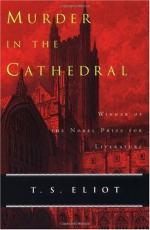
|
| Name: _________________________ | Period: ___________________ |
This test consists of 15 multiple choice questions and 5 short answer questions.
Multiple Choice Questions
1. What is the feeling of the general public in regard to the Archbishop's return?
(a) Indifference.
(b) Apprehension.
(c) Enthusiasm.
(d) Fear.
2. Fill in the blank: "I leave you to the pleasure of your __________, Which will have to be paid for at ______________."
(a) higher vices; higher prices.
(b) piety; reckoning.
(c) lies; the end.
(d) life; your strife.
3. What does the First Tempter predict for Becket if he does not "leave well alone?"
(a) God will show his wrath.
(b) Everything will be set right.
(c) His fat lady will sing.
(d) HIs goose may be cooked.
4. Why is the fourth visitor the most successful Tempter?
(a) He represents the people.
(b) He makes peace between Beckett and the King.
(c) He helps Beckett find peace.
(d) He voices Beckett's own desires.
5. What idea does the Fourth Tempter repeat that Beckett voiced on his first entrance?
(a) Everything is suffering and suffering is everthing.
(b) Action is suffering and suffering is action.
(c) Suffering is life and life is action.
(d) Life is suffering and suffering is death.
6. What does the First Priest believe was Becket's character flaw that ultimately brought an end to his friendship with the King?
(a) Laziness.
(b) Self-loathing.
(c) Cowardliness.
(d) Pride.
7. In Part One, where does the action of the play take place?
(a) The Cathedral.
(b) The King's palace.
(c) Outside the gates of the Cathedral.
(d) The Archbishop's hall.
8. After the first scene featuring the three Priests, the Chorus speaks again. What do they wish the Archbishop to do?
(a) Make peace with the King.
(b) Return to France.
(c) Turn the wheel.
(d) Bless them.
9. What month does the Second Tempter say Beckett will have power?
(a) The first to the second.
(b) The last from the first.
(c) The first.
(d) The last to the last.
10. Why does Beckett believe that the local bishops would not support a power move like regaining his Chancellorship?
(a) Because the Pope would not allow it.
(b) Because the King would not allow it.
(c) Because he excommunicated them.
(d) Because the Pope excommunicated Beckett.
11. When will the First Tempter remember Becket?
(a) At kissing time below the stairs.
(b) At night when the fires are lit.
(c) On ChristmasEve.
(d) On Christmas Day.
12. What does the First Tempter tell Becket he remembers?
(a) His loyalty to the king.
(b) The danger he is in.
(c) The hard times of the poor.
(d) The good time past.
13. What does the Chorus claim is their purpose in the action of the play?
(a) To prevent a murder.
(b) To warn Thomas Becket.
(c) To serve the Priests of the Cathedral.
(d) To witness the events and take no action.
14. What is the first word that Becket speaks on his first entrance?
(a) Peace.
(b) No.
(c) Stay.
(d) Wait.
15. What does Becket call "the springtime fancy?"
(a) The impossible, the undesirable .
(b) Ceremony.
(c) Acrimony.
(d) Leave-well-alone.
Short Answer Questions
1. What is not one of the ways the Chorus, the priests and the Tempters describe an unexpected death?
2. What is the first action that the Second Priest wants to take to welcome the Archbishop back to Canterbury?
3. According to the Third Tempter, what does friendship depend upon?
4. What position did Becket resign when he was made Archbishop?
5. According to the Four Tempters, what is man's life?
|
This section contains 557 words (approx. 2 pages at 300 words per page) |

|




